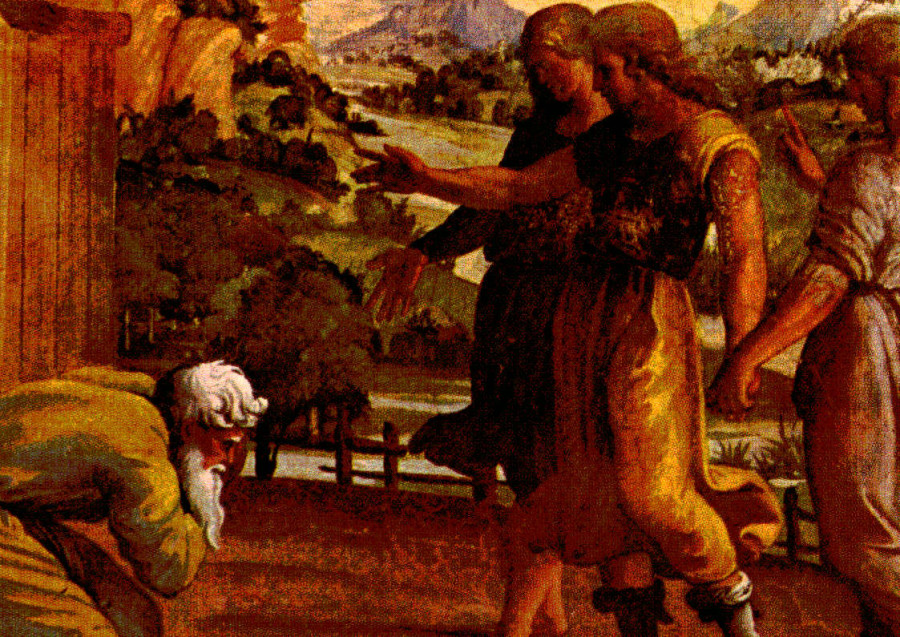“I don’t know,” said Gavin, feet on the dash, brow furrowed in thought, “college students just aren’t that hospitable.” Driving away from a youth theater performance of Singin’ in the Rain, we exchanged reflections on home-finding, transience, and living on a micro-budget. While hospitality may slip by the wayside, students do a lot of other important, hard work, looking forward to the day we’ll graduate, find work, and really make home.
But I think hospitality is so central to the story of the Bible that we would be unwise, “tent-dwelling” though we may be, to neglect to make hospitality central in our own lives, whatever our circumstances.
Old Testament Hospitality
It was during the heat of the day, the author tells us, that a man named Abraham, a tent-dwelling transient, was visited by three men.
Eighteen chapters into the Bible story, readers are aware that Abraham knew very well both his God and his calling. He called on “God Most High, Creator of heaven and earth,” (Gen. 14:22) who had blessed him, to “be a blessing” to “all peoples on earth.” (12:2b, 4) And that’s good theology. The God who created the land and its inhabitants owns it and rules it, even delegating co-regency to his image-bearing vassals. What the first rulers unraveled, God purposed to reunite through one of their righteous offspring. But corrupt offspring, marked by frustration with the cursed ground and violent envy toward each other, dead-end almost all of the genealogies.
But there is always one good seed. First it was Seth, from whom came Enoch and Noah. Then it was Shem from Noah, and Abram from Terah who kept the promise alive. Finally, it is Abram through whose family God promises to bless all people.
But back to that sweltering afternoon.
In a flurry of activity, pricked by the far-off sight of some of these “peoples on earth,” Abraham “hurried from the entrance of his tent to meet them,” washed their feet and showed them rest under the shade of the tree out front, “hurried” inside to urge his wife to “quickly” bake bread, and “ran” to his herd to select a choice calf which his servant would “hurry” to prepare. (18:1-8)
And as anyone who has hosted a dinner party knows, the telos of hurried preparation is always the leisurely enjoyment of your company.
After a slow dinner and the night’s sleep, Abraham’s guests arrived in Sodom. They were instantly met by Lot who, like his uncle Abraham, “insisted strongly” that they stay with him. And in this parallel narrative, the author repeats phrases word-for-word to show that Lot treated the men with the same flavor of hospitality displayed by Abraham.
These men knew God’s covenant: God blessed them with land and possessions so that they would bless others with them.
But the Sodomites flew in the face of these examples, knowing neither God nor his covenant. In the footsteps of their forefather, Ham, known to readers for disgracing his father in his own tent, (9:22) the Sodomites gathered around Lot’s house at nighttime to disgrace the three foreign men who dared impose upon their city. (19:4-5)
But five books later, it turns out not all of Ham’s sexually immoral descendents are godless. When Rahab, the Canaanite prostitute, encountered men of God, she had this to say:
I know that the LORD has given you this land… We have heard how the LORD dried up the water of the Red Sea for you when you came out of Egypt… When we heard it, our hearts melted in fear and everyone’s courage failed because of you, for the LORD your God is God in heaven above and on the earth below. (from Josh. 2:9-11)
And as the three God-sent men protected Lot in Sodom, Joshua’s spies protected both their hostess and her family from the coming destruction.
New Testament Hospitality
Many centuries later, an angel of the Lord interrupted what had to have been a restless night for Joseph, a direct descendent of both Abraham and of Rahab, who had been fretting over the most ethical way to treat his pregnant fiancee: “Joseph son of David, do not be afraid to take Mary home as your wife.” (Matt. 1:20) So Joseph welcomed the God-sent Mary who had just herself welcomed the God-sent Christ Child. But as Mary carried their child to term, this hospitable couple found “no guest room available for them.” (Luke 2:7)
And that night, one inn in Bethlehem found itself standing more in the tradition of Sodom than the tradition of faith. (Could the sin of Sodom be passive as well as active?)
Jesus was the longed for one, the Good Seed who would bless all people, and he blessed them in two ways: welcoming people home and being welcomed home. His Prodigal Son story features a father who hurried out like a servant to meet the one coming home, killing a choice calf in his honor, just like Abraham. He also gave the world a second chance to welcome him, becoming dinner guest to Matthew, Pharisees, and Zacchaeus.
But as we long to open our apartments and condos to welcome the one who says “I stand at the door at knock,” (Rev. 3:20) and knowing that we “are being being built together to become a dwelling in which God lives by his Spirit,” (Eph. 2:22) does hosting Jesus retain any connection to the land — with Rice-a-Roni and apples, sleeping bags and blow-up pillows — or is it only spirit?
Christian Hospitality: Hosting Jesus
Although Jesus said, “You will not always have me,” he also said, “You will always have the poor among you,” (John 12:8) and “Whatever you did for one of the least of these brothers and sisters of mine, you did for me.” (Matt. 25:40)
In his ministry, Jesus reveals the great mystery of hospitality: When Abraham hosted the three men, when Rahab hosted the two spies, and when we host any person, we host Christ himself and so become the house of God.
Intangible faith is tethered to the earth through practical care, James reminds us: clothes, food, and other physical needs. And he makes his argument by referencing two ironically familiar Old Testament examples: Abraham and Rahab. (Jas. 2:14-26)
Some Notes Toward Application
God says, “If you seek me you will find me, if you seek me with your whole heart,” which is true about him because it’s true about everything. If you look hard enough for anything, you’re sure to find it. So it is with hospitality, which is why Paul can say so simply: “Seek to show hospitality.” (Rom. 12:13)
When your friend moves back home because he can’t afford college housing, name your couch after him and “insist strongly,” like Lot, that he stay with you three nights a week. Anytime anyone texts you to say, “Sorry, I can’t make it. One of my kids is in the hospital,” offer free babysitting and make dinner with the “hurried” vigor of Abraham, that great friend of God. Welcome canvassers and salespeople in for tea; door-to-door workers aren’t often treated like people, and nights are cold.
Do anything that might earn you a letter from St. John that reads, “Dear friend, you are faithful in what you are doing for the brothers and sisters, even though they are strangers to you. They have told the church about your love. Please send them on their way in a manner that honors God.” (3 John 5-6)
If you are skeptical about hospitality, your theology may be closer to Ham’s than Abraham’s.
You may not be a cook, and you may not be a homeowner, but you are God’s house, and Jesus is knocking.





Leave a Reply
Your email is safe with us.